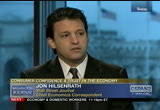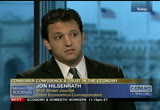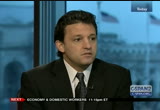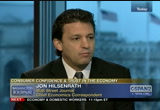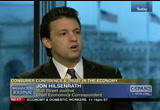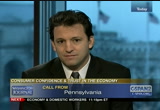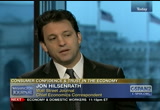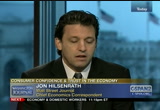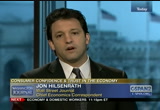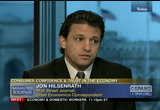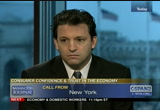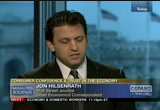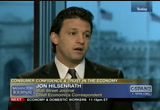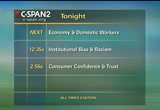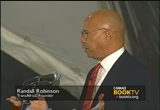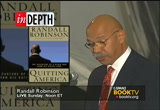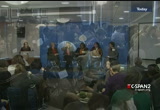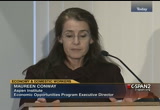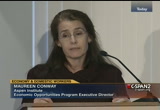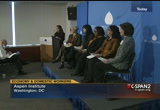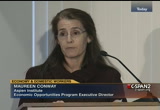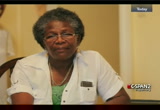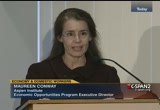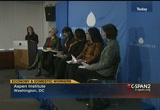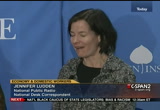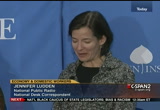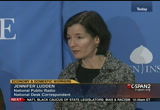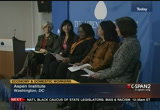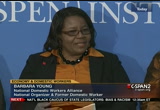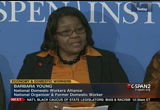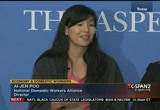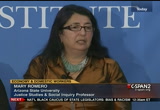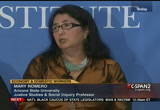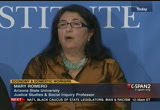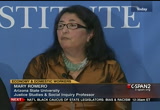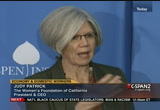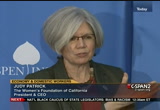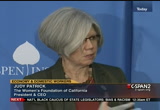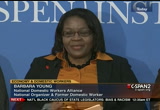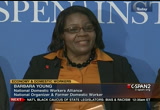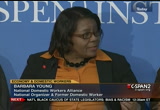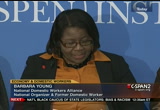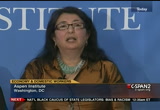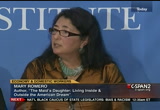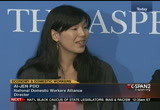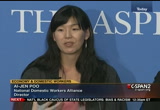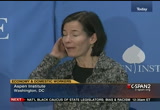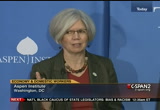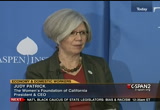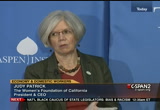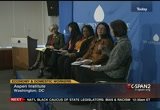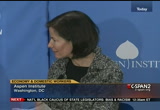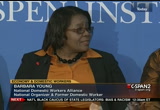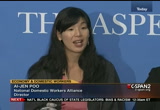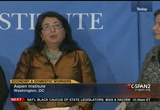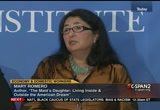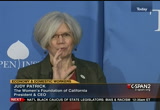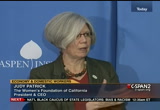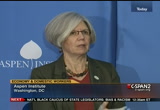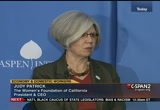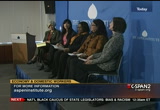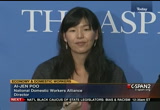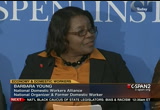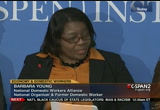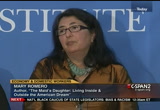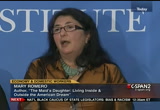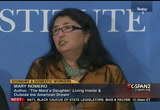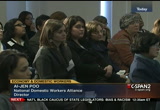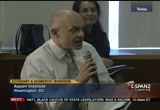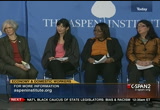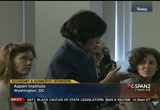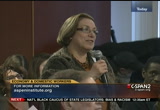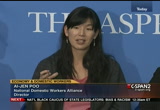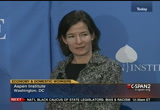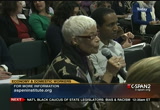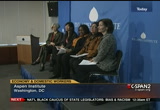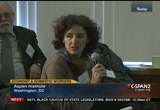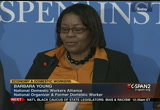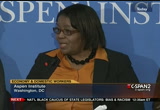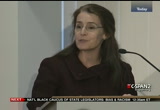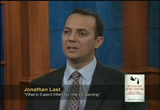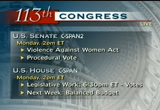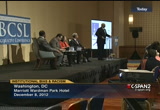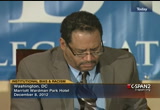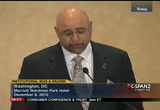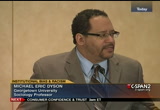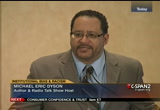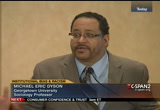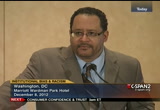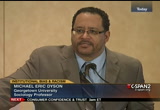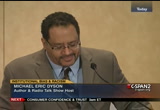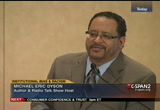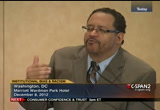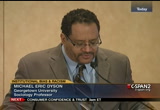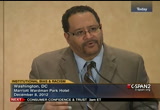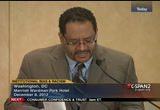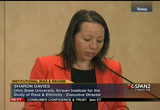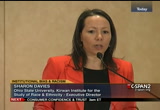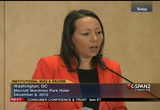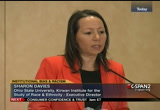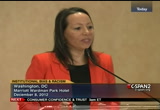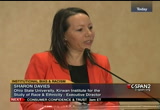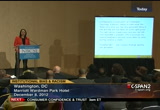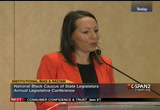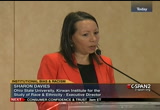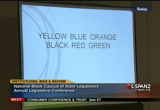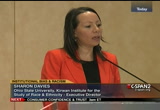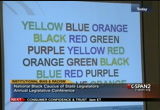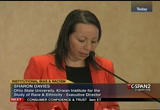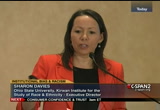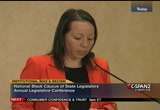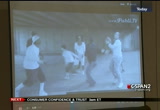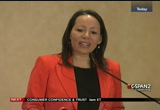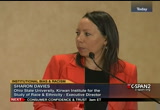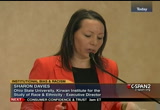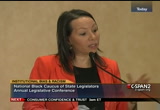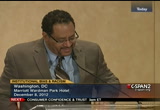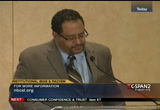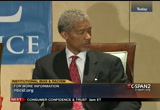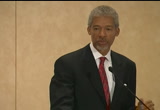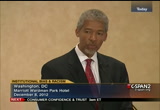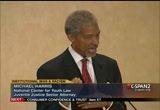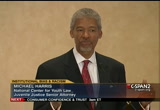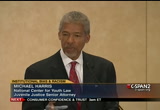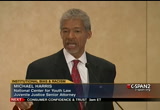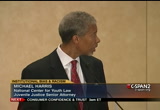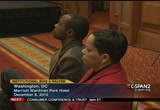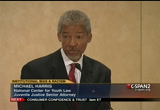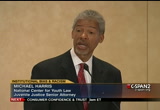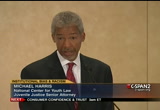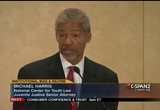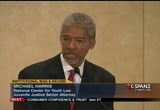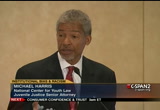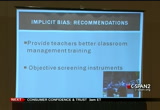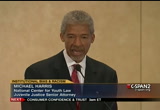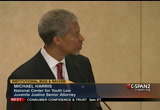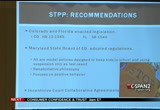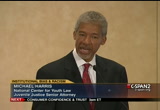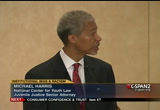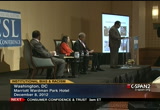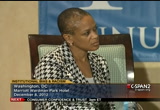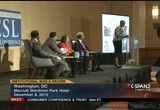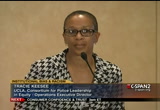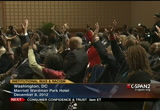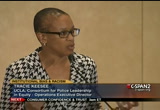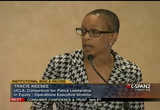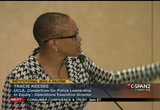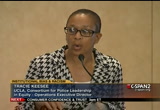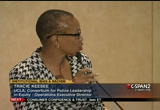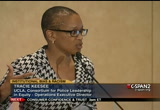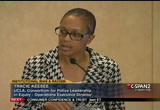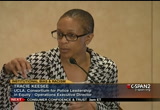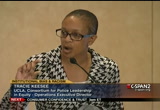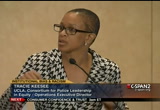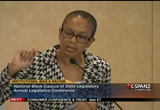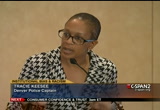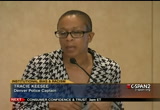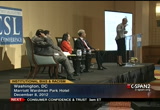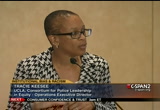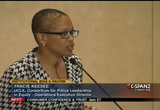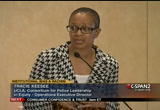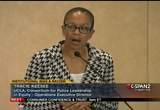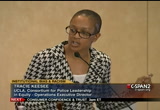tv Capital News Today CSPAN February 1, 2013 11:00pm-2:00am EST
11:00 pm
the pendulum has swung clearly today sent in american society and the family unit policeman on the street to keep the streets safe. in order to enforce rules of fair play in the markets. the question today is how do you calibrate? how far are you willing to go? but it's still early sent the financial crisis in the debate hasn't been resolved. just to make a counterpoint, some conservatives that argue that washington played a role in distorting the market that went awry. there's elements of truth on both sides, but it is the case then a man freddie mac, these
11:01 pm
two giant wordage finance firms played a role in writing that mortgages written in the housing boom are creations of congress in the capital requirement for this institution and oversight of those institutions was sent as it was for the banks. .. >> guest: i saw the elements of this in so many different facets of what i was covering.
11:02 pm
i covered the federal reserve, it was clear to me from covering the fed that the publickest make of that constitution that is changed in the last few years. when i look at morning market and stock market, why look at the rangeling that goes on between republicans and the white house, i mean, it's clear there's common demon nateers here. i want to understand more about them and more about what was happening. i should say i got a lot of response to the story, and i get the sense from what viewers are saying too, i mean, people i think there's starting to recognize there's a problem. i talked to a few companies that see this as a fundamental problem with business and trying to address it. i'll give you one example, it's kind of a frivolous one. it's worth mentioning. domino's pizza ha a campaign a
11:03 pm
couple of years ago where they basically db the whole advertising campaign was built around acknowledge to the public that the pizza stunk. and they decided to redesign their pizza and, you know, approve it and make it tastier and improve the ingredients. they built the marketing campaign around acknowledging that the pizza they used to be selling wasn't up to the standards that they wanted to have. i talked to the senior people at come come dominoes and they said we want to rebuild trust with and they saw a broader trust problem. people responded positively and dominoes had a good run. i'm seeing this with other companies talking about and thinking about how do we build trust. how do we rebuild trust with our workers, you know, this also when you look at the trust surveys that are done, there's
11:04 pm
ban big break down in trust towards big corporations and in particular and top managers at big corporations. and so, you know, you're starting to see some discussions at some of these big corporations like dominoes about the recognition of a problem and, you know, strategies for trying to rebuild that. >> host: in pennsylvania, gerald, republican line. >> caller: good morning. i have a quick comment and a question. first of all, he said he would rather face a standing army than have a central bank. i don't trust anything the government says and the numbers they put up. i think the stock market is totally irrational because of the low growth. and i have a quick question. my sister almost two years ago bought a house through a big bank. we excellent credit rating and good financial background. before we made our second
11:05 pm
payment we had a letter that the loan had been turned over to freddie mac. now i don't understand that. i've never gotten a good ebbing play nation -- explanation as to why they it would on the back of the taxpayers it's going to be a good loan. doesn't make sense to me. >> guest: well, i'll make two points. one on the loan and one on thomas jefferson. so on the loan, this is the way the mortgage system works. the banks write the mortgages and the vast majority of them are handed over to fannie and freddie mac. they have tended not to hold them on their own balance sheets. fannie mae and freddie mac have a competitive advantage they are backed by the united states government. they can borrow at the lower rate than the typical bank, and it's the way our mortgage finance system has been constructed over the years >> host: can i get you to respond to the latest numbers as far as jobs are going. bureau of labor staingts for
11:06 pm
january the rate goes to 7.9% 157,000 jobs added. >> guest: right. >> host: what do you say? >> guest: what i see is in an economy that isn't growing fast enough to produce many jobs. the unemployment rate was 7.8% in december, and, you know, it had looked like it was moving down and now we see that it pops up. and the reason for that is 157,000 jobs created in an economy with 140 million workers is not a lot. it's not enough to keep up with growth in the labor force, so, you know, this is a fundamental problem in our economy. you might argue the fundamental problem in our economy right now is that we're not growing fast enough to bring the unemployment rate down to levels that most americans would find acceptable. and we can have a loan discussion about -- long discussion about why we're not
11:07 pm
growing fast enough. you know, you could argue that the economy needs more investment, that the government should be providing more stimulus. you could argue the government is getting in the way. you can also argue that it's a res due of the financial crisis. >> host: the number of employed persons was -- little changed in january. the number of long-term unem employed unchanged to 4.7 million and the number of persons employed part time for economic reasons add about 8 billion changed little in january. >> guest: right. yeah. our economy is stuck, you know, and most recovery you would see an economy growing three or 4% in the first few years after the recovery, and we grew 2.2% last year, which wasn't much were the than the year before and worse than two years before that. there a lot of reasons for that.
11:08 pm
one of the reasons is all the debt taken on in the housing boom. basically at the end of the day, when you borrow money that is a claim on future income, a lot of claims on future income right now that are coming back to pay right now. it goes back to what the 18-year-old caller was asking about some time ago about the economy build on debt. you need debt to fund investment and fund growth. there's certainly important uses of debt to build for the future. but what happened during the boom housing boom was people were taking out debt not to invest but just to build a bigger play room. and that's one of the factors that is holding us back right now. >> host: we'll going charles. this is in new york. democrats line. >> caller: hi. i'm glad you talked the unemployment numbers. i work with the labor department
11:09 pm
for years, and, you know, it's not taking in to consideration the fact that most of these jobs new jobs create certainly low paying jobs and secondly, there's a tremendous amount of not included the unemployment rate. certainly not receiving -- they're not including people on public assistance. so it's not a fair barometer of really what the numbers are that people unemployed. in terms of the degree of trust posed a time ago he went true a lit any of thicks not to trust. but the key piece he mentioned at the send nobody has gone to jail. and until somebody goes to jail, the general population will not believe that it's a fair system
11:10 pm
of justice and it's justice people want. they want truth and justice. and -- [inaudible] i read the "the wall street journal" sometimes the people who tread on a daily basis. a lot of times don't really care about trust. okay. they want to basically say here, maybe i can get by with the latest system works. >> host: okay. we'll leave it there. can you talk about what it means for the people's trust in the government do something about the numbers. >> >> guest: it's one of the points i talked about a little bit in the story. after the great depression you saw fdr create the new institutions, the security and exchange commission, they were meant to oversee the securities market, and to put a backstop behind banks and, you know, it
11:11 pm
was one of the factors that helped to rebuild trust in the financial system and in the banking system and in the economy. but, you know, one of the problems that we have right now is that because people don't trust the government, the government hasn't been terribly effective solution to the aftermath of the financial crisis. you know, there's some people who argue the government should have done a bigger fiscal stimulus. a lot of people have serious doubts about whether that would have done any good. with got a good one but people argue we should have been getting more. there's the forces that held back a more aggressive response by the government and, you know, a lot of people would argue it's too much. >> host: the 157,000 jobs
11:12 pm
11:13 pm
racism. he wrote that the most important office in a democracy is the office of citizens. democracy, of course, is rooted and based in the notion of an enlightened citizen. some of us think democracy is defined by the ritual of volting -- voting of course voting is important in a democracy. but voting takes place all over the world.
11:14 pm
it takes place in democracies, it takes place in dictatorships, it takes place in tow toll yaren societies. voting alone does not mean that we live in a free society. it takes that enlightenedment many to action causing those whom we would elect. to honor our ideas as a nation. >> author, activists and transafrican founder taking your calls, e-mails, facebook comments and tweets in-depth three hours live this sunday at noon eastern. on booktv, on c-span2. john mccain's 2000 campaign when he ran for president is the most
11:15 pm
memorable campaign. i mean, any ever covered and been around. it was just -- we'll never see it again. here he was, you know, facing george w. bush who had all the courage of the republican party backing him and the three republican government in new hampshire and all the money and john mccain held 114 town meetings and stayed there until every question was answered and you sigh the light. bulb going on saying when are we going get it right and john mccain say we're not going to get a patience bill of rights sloption my company is owned by the insurance companies. next question. it was just, you know, and it was refreshing candor. you see it in people's responses. and he was totally open to the press. i mean, it was a candor and openness and sort of a welcome pes. i mean, that no one had seen before and no one certainly seen
11:16 pm
since. on the career in politics and the washington press corp. sunday night at 8:00 on c-span q & a. now a look at the economy and u.s. domestic workers. we'll hear remarks from individuals who employed in homes to care for children, the elderly or disabled. held by the aspen institute. it's an hour and twenty minutes. [inaudible conversations] [inaudible conversations] good afternoon, everyone. i don't think it's on either. [inaudible] [inaudible] it's on now? great. good afternoon, everyone thank you for joining us. i'm marine conway.
11:17 pm
i'm delighted to welcome you to today's event. home economics, a discussion about the unregulatedded world of domestic work. this is the fifth employment sector we are discussing in the series. ideas that can work for employers, employees, and the economy. and i'm very grateful to the charles -- for their generous support of the discussions here. today in america about one in five working adults are in jobs that can recent belie characteristickized as low wage. if say that were able to work full time for a year they would not earn enough money to lift the family of four above the poverty line. over the past few years as we come out of the recession, we have seen that relatively more of the jobs have been created than sort of mid wake or high wage jobs. more over, when you look at
11:18 pm
projection from the bureau of labor statistics which about occupations are most likely to create the most jobs. the low wage jobs are projected to create the most jobs. the challenge of low wage work is a significant challenge that we need think about how to address. is to improve their jobs process through training and helping workers get the skills they need to get in to better jobs. and certainly providing skill building and training opportunities to the very important things that we should be doing more of for everybody who needs and wants additional skills. but as i spend time and i have spent quite a bit time talking with people who run training programs in a variety of place i a cross the country. over the past few years, i hear more and more that quite a lot more people who are in need of
11:19 pm
skills and better jobs and who are coming to then than the job opportunities they can see in their economy that will actually support a family for which they should design training and help people get in to. the numbers weren't working for them. you have a good program and make it larger. they said i can't find more jobs. so not really any point of making it larger. so this is sort of the con numb drum that lead us having conversations and think about what are oh ideas throughout for improving the quality of jobs. so i didn't know what the answer was. that's why people like this come and talk with us about what might be done. in some of our previous discussions, we have looked at restaurant and food industry, residential construction, home health and long-term care, retail training, those
11:20 pm
conversations we set up we would sort of a three or four page summary of, you know, sort of information about the industry what our industry trends how many workers in the industry and what do they look like and what kinds of skills and experience they have. we talk about doing that if this one too. there's very, very little information about domestic workers. if you go to the bureau of labor statistics website and put in domestic workers. mostly what you get is a link to foot works saying they are excluded from the data set. they're not included in payroll employment. they're not included in insurance records, unemployment records, and it's a very private employment relationship and there's not much information about them. the second reason is that we have great report from the national domestic workers lines and the colleagues and i could hardly do better than that.
11:21 pm
so and i really recommended to you, they surveyed over 2,000 domestic workers. it has lot of great information it about the wages and working conditions and what the work of domestic work is really like today in america. so in lieu of a few facts and figures about the industry we thought we would set the stage instead by having you hear from a domestic worker about how she thinks about her work. and so i will ask my colleague to go ahead and show you a brief film about four minutes from a domestic worker. ♪ came to the u.s. -- [inaudible] three years ago and i'm taking care of the elderly and kids for the past nineteen years. >> i started in barbados when i
11:22 pm
was teenager and then -- [inaudible] very early, as a matter of fact and especially if your parents were not the kind of parents to push you in to education but to -- [inaudible] follow one miff dear and closest a pediatrician. the day they met him, he was sitting in his den and i asked him if he could walk and he said yes. i said, as of today, you'll being have your meals in the dinning room. i started the process of bringing him overt shell that he was slowly putting himself in to. watching tv and seeing the violence and things that were happening. he was scared another time. [inaudible] one end from the patio and the other. there comes a time. and i kept on doing that until i got him in to the wheelchair.
11:23 pm
and soon after that, he started going to -- [inaudible] and stuff like that. ic being a part of each other's life not wanting to make him feel better. also prolonged his life for six and a half years. to me -- [inaudible] [inaudible] [inaudible] he said you're no fly in the milk. i mean, it made me feel welcome. they did. i was taking care of like a human being. had a great influence in doing my ged because he always said to
11:24 pm
me, you are better than some of the doctors that i worked with. because of your bedside manner. when i finally got my ged. i was 35. 53 you're never too old to learn. i got my cpa through domestic workers united. [inaudible] to get certification is very important. especially when you go on a new job. it also helps because it tells you [inaudible] we learn pediatric how to take care of new baby. we learn nutrition and taking care of kids and stuff like that. you learn negotiation. you learn how to carry yourself your presentation is very important. i'm proud of being able to draw people out that i'm taking care of. and i can get that person to
11:25 pm
smile. i'm happy. and it make my day. and i hope that this piece would also not only tell employers that domestic workers are hiewbs too, and we need respect and also telling domestic workers to respect thairses. when you respect yourself, respect -- [inaudible] [inaudible] ♪ >> okay. that was a really nice clip. i want to thank the caring across generations campaign for that. there's others on the website. what i particularly like about that story we'll have a lot of conversation and you can read about some of the challenges domestic workers face. i particularly like that story presents how can be very positive experience as a domestic workers and there's a
11:26 pm
positive for this work. that's what i love about the panelists today. they recognize the challenges they also hold the positive vision of what is possible. so let me quickly introduce them so you can have a conversation. i do want to make a couple of quick announcement. one, we will be doing q & a following the panel. please wait, we're recording and please wait for the microphone and introduce yourself. we are tweeting and the hash tag domestic worker ai. keep your phones on sigh lint. okay. now i can introduce our panel. you have their bio in the material. i'm not going read the them to you. i'm quickly introdisuse them. near my is judy patrick.
11:27 pm
arizona state university, and we're very grateful to have jeb for laden of npr to moderate the discussion. i'll turn it over to jennifer. thank you for being here. >> thank you maureen. thank you to comping. i'm happy to see a number of men in the audience. that [inaudible] we know it effects everyone. thank you for coming. i personally have had the experience of -- i think the idea was something that struck me until three months pregnant.
11:28 pm
i certainly you have the home health care aid. i'm sure nobody thinks they will need it. i think surprises people even though it shouldn't. it was striking that the process of finding something for a fundamental role became so haphazard and completely unregulated and you're talking to friends and looking at ads in the local newspaper or going on someone else's word. it's frightening and crazy in a way. and really overwhelming. i think it's the most stress i had of thinking ahead of having children and the cost of college tuition. [laughter] but this was stressful. and of course you find a before care giver that makes everything work. you realize it's a unequal relationship. you're in charge, there's no union. there's no contract unless you
11:29 pm
draw it up. and you, you know, you come to understand wonderful people you really like may not see benefits or taxes that people may not ask for this pros may not ask for this. it's really uncharted territory. and of course, there are abuses that some of them we read about in the media and others we don't. and the big picture as maureen mentioned it's a huge growing area. one of the fastest growing area in. we have the baby boomers recently turning 65. that's a huge demographic movement in the economy that will drive this industry, and yet you have wage pressures all around for home help aids in particular. much comes from maryland candidate and the government. we know the budget pressures there and the individual employers side. you have budget pressure because it's not just care giverring but
11:30 pm
other people in low wage jobs. national unemployment law project reported lower wage occupation for 21% of job losses during the recession. 58% of new jobs in recovery. so how can domestic work largely unregulated provide not just jobs but decent jobs that will keep them out of poverty? what the challenges and opportunities? we'll take a little bit later about immigration reform and the perspective for that. so let start with challenges and opportunities. barbara, since you have been a domestic worker, tell us about your experiences, the good, bad, and challenges you hear in your work today from care givers. >> as a domestic worker, we take care of the most -- [inaudible] of the employer's life, the children, the elderly parents
11:31 pm
with and the home. and i did that for seventeen years. and i started as a elder care giver for one year, and then i witched and became -- switched and became a nanny. i did both live in work and outside the home work. i would say what is good about a job, you interview for the job, you meet the family, and then there's the kid. and then i start -- [inaudible] that's a good example. [laughter] this is a good part. you get to bond with the kid, and i'm -- the parents go off to work and i'm in the house with the kid watching the kid, you know, taking care of the kid and you see how close the kid becomes to you, and everything
11:32 pm
that kid does are you proud of me? are you proud of me? yes, i'm proud of you. and the kid trusts you a lot more than they trust the parents. [laughter] than is one of the good parts about being a nanny. then you goat love, really love the care work you're doing and you hear people who are taking care of the elderly they tell you how the elderly person gets to love them and look up to them. and the care for the that they are giving them. the bad thing about the job, i would say is sometimes the pressures. there's no guidelines. lower pay as the report will show. how many workers are working below the minimum wage in the job. and then there is the long hours
11:33 pm
that you work as a care giver in some person's home. i was working between 12 to 1 hours a day. some people work longer hours as much to ask -- [inaudible] it depends on the job you are doing. at one point i did a 24-hour job for ten months. i started with five-week old baby and sleep in the same room with the baby and i had to wake up in the night and take care of the baby every three hours. and then again, there is the lack of benefits in these jobs. i had no health insurance, and one of my jobs i had no social security, and the report will show only 9% of the employers pay social security for their workers that theism employ.
11:34 pm
>> this is the -- this is some of the challenges that you get in working in the home. >> let's hear more of that. the national domestic workers alliance did a report recently. give us more highlights for what you found. >> sure. absolutely. so we found in our survey that more than 20% of domestic workers are earning below minimum wage, and when you look at live in workers conditions it's even worse where more than 60 percent of the work force that works live in earns below minimum wage. what it translates in to is just deep poverty, food insecurity, so we actually found that 20% of the work force has been in a position within the last month of when the survey occurred that they didn't have enough money for food. and so what we have -- what we have found is that work force that we count on to take care of
11:35 pm
our families can't actually take care of their own in the situation. >> marry, can you give us a historical perspective how it evolves. what are some of the hidden costs in the structure. >> it's interesting to look at comesk service. it's managed to survive slavery, lawsuit lymph, and capitalism. yet it's still carries -- each of those to a certain degree. and i think we see those specifically in the way in which it hasn't been included in labor regulations that we have with other jobs today. and of course the kind of work is not going to disappear because still have to raise their children, they have to care for their elderly, and they need to care for those that are sick. with a we find right now is a continuum in that we're living with. one, on one side you have
11:36 pm
domestics who employed to work for one employer they may be doing that the liveout or a day work kind of situation. they may or may not be receiving benefits, social security, taxes being taken, so forth. you also have the emergency of co-op workers. they are developing their co-op and working together. and you have cleaning agencies which don't necessarily provide any better working conditions or pay or benefits for the employers. the work situation also there's a variety if i in there. the women are hired with a job description that may include child work and find themselves expected to cook, to clean, those that are doing hired to clean house may find themselves cooking and doing child work. there is a difficult maintaining the job description.
11:37 pm
and there's working condition as barbara mentioned. the long hours and the variation in the amount of pay they receive. and there's also exposure to toxic chemicals particularly for women who are cleaning the houses. it's interesting to look back at social science research because in the '60s they predicted it's a banishing occupation that americans would never be able to tolerate having to work with or maintaining an occupation in which they considered someone inferior, against the american character. they figured it's going to be comod fighted and leave the household. however, this didn't occur. although african-american women don't dominate the occupation anymore, women of color primarily immigrant women dominate the occupation. we find that women have left the homes and working up by the home
11:38 pm
in large numbers. there is no state programs to help working families. there's no state programs to help them care for their elderly. people are living longer today and living alone. and the way we live has changed our commute to work have increased the amount of time that we work increases so we have less and less time to do this kind of labor on our own. and of course, the hidden cost there are hidden cost within the employers. employee's family if she's not there to do the work, her children go without. in order to provide financial means for the family, there's also the hidden cost of working families for all both the employers and the employees. the state has not stepped in to help these individuals and if we don't treat this as a private issue rather than a public issue
11:39 pm
. >> judy, the woman's foundation of california? you work build women's economic security. can you tell us how you define that and what you are you doing? >> so we define economic security really based on the work that opportunities for women. pioneered many years ago and using the basic economic security tables and thinking behind that is women in the family are economically secure when they have enough to meet the cost of the resources and social connections to meet the costs for good house, for healthy food, for access to good education for their kids. health care, transportation, sort of the full package. so for a family of four, right now that -- this is a county by county calculation. it's around $68,000 to meet the basic costs.
11:40 pm
to this is the equivalent, if we use the u.s. minimum wage of four-full time jobs to meet the basic cost of living. i think, you know, to talk a bit about the culture challenges with many of those about the challenges many have been mentioned. i think, you know, the whole set of culture challenges we can't ignore when we think about the issue. resulted in workplace the system that doesn't have the policy and protections we need this place to let people take care of their economic needs. and jennifer mentioned when we started this is women's work continue to be the value in this country regardless of what it is. i think there's an extreme devaling of the work that domestic workers do.
11:41 pm
i'll talk about it later when i talk about the policy we're doing in california specifically with our governor there. and there's i think there's a way that the argument gets made that this is allowed women step in to the workplace. i think it's also provided some men, again with the opportunity to not carry their full weight and maintenance of household. i think this is one of the culture issues we have. we have a rush to the bottom in the country in terms of services and with a we pay for goods and i think we all want to get the best price on a good service that continually depresses wages.
11:42 pm
>>let talk about employers a little bit, judy, stay with you. we mentioned parent of young kids, children of aging parents or the elderly themselves will hire someone. a lot of business hiring women. what should we keep in mind when we look at this and think about the employers? i want to tart by saying there are good employers out there. i think there are employers who don't do as good as job as could be done in taking care of this particular work force, we are lucky at the women's foundation. we have a group of donors and the associates and friends that care deeply that hire domestic workers that care deeply about the population that have really been willing to organize their friends and lobby on bhaft legislation we worked on in california in sacramento.
11:43 pm
i think that made it a huge difference. but we also, i think it's about orbing. it's about organizing workers and organizing employers. to help employers understand what does it mean to provide a good working situation for the people they employ. what does it mean to write a contract? there's a lot of education i think we can do on this side of the equation. that's part of the work we have do. >> barbara, what would you like to add for the relationship. you have advice? >> i can tell you my experience in working with employers. they there are some good employers.
11:44 pm
that don't see themselves as employers. they interview -- app cants and choose one person that they think is the best for the job then the person who went to work. they don't see themselves as an employer. and so they give you a task to do. i started in [inaudible conversations] and i was getting less say than the minimum wage. four years after the second child. after the second child i didn't get any increase. >> did you ask for it. should you bring it up? >> i did not. i didn't bring it up. they didn't offer me anything for the second child. and there was a live in job. hiewfer i stayed with that job for eight years.
11:45 pm
and see how the kids get so close to me and i would say to the child when your parents come home. we'll talk to your parents and i did already. they go and say hell lee and they come back to me. and they -- [laughter] and they just want to be with me. the employers have no guidelines. there's no set guideline for employers. then they hurry you and enincrease the task you do. they pay a flat rate. i think what we need is for employers to have guidelines and regulations to follow in hiring a worker. most workers are afraid to
11:46 pm
complain for fear of losing their job and retaliation. this is all they have to support themselves and their families. and [inaudible] it's something at the end of the week even hope it's little pay. and then they need a way to document their hours, and this is as an organizer this is what i say to people. get a notebook and document the hours you work. so you would have something if the employer gives you a contract whether verbal or physical contract, you would have something after you document your hours that you can look back, you can look back to. and these are the things that happen then, the work continues and more tasks are added and
11:47 pm
more relationships start to go bad. because people are internalizing what is happening in their home. remember, we're not family members. as domestic workers you're not family members. we're there to exchange work for a paycheck. >> which can be hard to remember. the children probably think of you as a family member. mary what else can be done to impose regulation on the relationship and give more power, i guess to the employees. >> toiled build a little bit on what barbara said. >> what i've come across is a stlong feeling that the relationship defeat the employer and the employee in this situation is quite different. because they're engaged labor of love, that needs to be treated different. it's unique for other kinds of swaif situations. i have to say i don't accept
11:48 pm
that approach. because it allows for excuses to justify micromanaging and also for exploiting the worker. it's interesting to look at the research on employers practices and vs. very clear that employers hire on the basis of who they feel comfortable with. who do they feel comfortable on their home. giving orders to? who do they feel comfortable that cleaning for them? and et. cetera? instead of that. it seems to to me any that any other work situation. an employer should be working at the workers' experience, skills and hiring them on the basis of that. if you hire the best employer out there that has a experience and skills, they don't need to be micromanaged and respect them as a work ena you would any other situation. so ploirs need to recognize when they hire somebody to do care
11:49 pm
work or clean their house, their home becomes somebody else's workplace. they need to make that adjustment and respect the employees and their rights and respect the work they do. >> is there a way to encourage more of this kind of thinking? in employers without alienating them. what are you drying to do? >> i would say employers are diverse as diverse as the work force, and i think that we have assumed the best assume people want do the right thing. they know what it is, and we name easy for them, they will step up and so we have actually worked in close partnership with employers over the years and in new york state, for example, employers were heavily involved in winning a bill of rights for domestic workers that was passed
11:50 pm
in 2010. we went an organize called -- and they formed an association of employers through many different synagogues in new york city and that employer's association essentially came and said they belief in standard and guideline answer they believe that having standards and guidelines was actually in the employer's interest as well. because they were tired of the very arbitrary, unpredictedble, as much as it's a wild west for workers. it can feel that way for employers as well they created a supportive space for employers to come together. talk about their experiences. employers what their struggling with and grappling with them and supported them to understand what some good guidelines might look like. >> something you can download. >> you. it's on the website on the domesticemployers.org.
11:51 pm
the association is national called hand and hand. and under the notion that healthy homes and god workplaces go hand and hand. we were -- we did all kinds of educational forums with organizers. we're organizing together in a neighbor called park slope in new york in brooklyn to create a neighborhood-wide code of care. where employers and workers and local businesses and local elect the officials officials are supporting a set of standards that questions beyond the domestic workers bill of rights in new york state. and i would say that that experience has lead to just a lot of different kinds of creative ways of working together across workers and employers to promote standards, respect and dignity. and i think that there's a lot of possibility there. and they're actually doing trainings for employers about what it means to have someone working in your home and what kind of dynamic it creates and
11:52 pm
what to look out for and how to prepare. and things like that. it's a partnership there, and we were able to do things like we organized march a children's marge for the domestic workers bill of rights that was lead by the children that dmoask workers care for, the children of employers, and the domestic workers' children themselves. there were signs that respect my mommy and my nancy and it was the kind of thing that showed what is responsible when you create the opportunity for people to cothe right thing. and support them to do so. >> you mentioned training for employers. maureen rein talked about training for employees as a way to increase skills to hopefully increase pay. what is happening in the roam for employees ab the question is does it pay off? can someone find higher paying job if they x skills?
11:53 pm
>> our work has been the national domestic workers alliance has been working to bring domestic workers together shine a eight light on the reality that barbara and other talked about. the need for strong protections and guidelines and for us have a public conversation about the need for care. it's a reality and we need talk about it. and as have done things like fight for labor protection in new york in 2010. we passed the first domestic workers bill of rights and we are working to pass similar legislation in california and i think judy is doing to talk about that. and three additional states, massachusetts, illinois, hawaii, and four more states in 2014, we're in a moment where there's increasing awareness and an opportunity really reverse the
11:54 pm
historic exclusions that this work force has faced in the labor protections in the labor law framework. and there's a really awakening, i think in an opportunity to have this conversation and more public way. and training programs are now being skilled and rip candidated around the country as well as elder care training programs and more and more people are starting to understand it's a skills work. -- what would you lock for? part of the challenge in philanthropy and within the public government sector and the work force development system a deeper understand what happened in the work force. so this is such a draw i think among philanthropists and the work force development system,
11:55 pm
the work force investment boards to think that where we need to invest now is in helping people getting training they need. and jobs in career ladders. that would be wonderful. but as maureen said. these are not the jobs and sectors growing had our country right now. part of the work in philanthropy, i think is to help is for this community to understand that we have another challenge, which is to improve the quality of low wage work. and i think that is a lot of what the domestic worker movement is really about and there are other places, in our country where we're finally saying leath make these better jobs because it's where the jobs
11:56 pm
are. and it's a different kind of investment. we have to convince philanthropists and the public sector that it's wort the investment to really stablize women and families in employment. so i think that is part of where we need go in philanthropy. and part is advocacy work within the public sector that looks at the metric of the work force investment system and what gets measured and where the investments get placed. i mean, we have doing research in california right now to look at how can we invest in jobs training for low wage health care workers, domestic workers, home health care workers. i have been told so many times in talking to people working in work force investment. it's a population is simple. it falls off the screen. because the system doesn't work for training for the people.
11:57 pm
yes, i think training is really important. fundinged a voted candidate sei -- advocate that can help shift this. funding communication around the work. it's another role that philanthropists can play. funding alliance building that is necessary. we certainly seen in california that one of the big challenges in getting the domestic worker bill passed was the impact on the disability community. all right. that is a piece of work that is, you know, it requires time and needs to be invested in because these are both populations that we care about. so how do we resource the work to build this alicense? and tell us more about the community. which has been vocal and inflowcial in some of the areas. >> so much of so many people in that community are depend i want
11:58 pm
on the care funded by public dollars, and so, i mean, their fear is that if their cost of getting care go up, they will get less costs. or less care at the time when state budgets are shrinking every place. >> it came out when the obama administration proposed change to the wage and hour and overtime regulation -- [inaudible] very concerned. >> absolutely. and it played out in california in exactly the same way. >> okay. i lay out a plan for expanding the state. organizing around this. barbara you're involved in that. tell us in your experience. what works and what hasn't worked in trying to organize grassroots movements in this area. >> the national dmoask workers
11:59 pm
alliance is growing. we started in 2011 as an organization and today we are -- [inaudible] organizations in 23 cities. and we are amplifying the efforts of domestic workers mostly immigrant population that is doing the work now. and our efforts around the country and around these workers. to influence their life and what we have -- [inaudible] we have a training program now for the domestic workers and the solidarity organized in leadership program, and to mobilize and to build leadership
12:00 am
among domestic workers. i didn't talk about the new york domestic workers bill of rights and we're trying to have more domestic workers bill of rights because we are an excluded work force from the national labor relations act. and and we want things to establish the domestic workers. >> it must be difficult you talk about the long hours. ..
12:01 am
a might with care workers, and we talk about the elderly and the disability group being paid from set dollars for this year, and one caregiver passed me a note -- we had one of the experts talking about a decent job, and she passed me a note and said, i'm working for $9 an hour. is this a decent job? she has two clients, two elderly people she is taking care of. four hours for one, and another person for four hours. so, then we talk about having a
12:02 am
decent job, we mean a job that paying a living wage, that some person can really be able to eat and take care of themselves. and they still have to increase the pay for the workers that are taking care of the disability, disabled, and the elderly. so, that the people who are taking care of them can live. >> who has been your allies? this effort? and i'm curious about the role of organized labor. >> okay. well, we say that in a campaign or movement for human dignity, there's no such thing as an unlikely ally, and so we actually have made friends and built partnerships in all kinds of places, beginning with employers and even there we're
12:03 am
building strong relationships with the disability groups, and older adult groups, senior groups, and all kinds of organizations, and we have had a long-standing partnership with the afl/cio, and the tread union movement does see the changes in the work force and sees that this sector is one of the fastest growing work forces in the country, and that if we're to try to improve working conditions for workers and rights for workers in this country, we have to be a lab mayor movement that is inclusive of this work force. so, for several years we have been building that relationship, and we're now in a long-term campaign called carrying across generations, and boat aflcio and afscme check havety have care workers and we're putting forward a vision that is
12:04 am
inclusive not just of home care workers and dockworkers but also of the consumers and workers and domestic workers, and the whole goal of the campaign is to expand access and affordability for all of the families who need care support and services, and individuals, as well as improve the quality of these jobs for workers in the same vision and the same agenda for a more caring economy and a more caring country for all of us. so, it's a vision to create jobs, make sure shows jobs are good jobs you can take pride in and support your family on and also to support the families who are really struggling to afford the care and support that they need. and that is the kind of work that we believe is needed in this moment. it's like -- it's not us and them. it's all of us together, and when we make that's priority for the country, so much is
12:05 am
possible. the challenge with the austerity budgets is that it is coming from this place of scarcity, and i think we all know there's so many ways in which this country is resource-full and our families are resourceful and our work forces and when we make something a priority we can make things happen. so so they're working to make that's national priority. >> so many workers are immigrant women. tell us about some of the challenges and maybe strategies for engaging them, keeping in mind that some of them at this moment may not be of legal status and really reluctant. >> i think that the long-held belief that immigrant workers cannot be organized and they will not take the risk. however, there's a lot of success stories that really challenge that myth among janitors and among construction
12:06 am
workers, restaurant workers, hotel workers, and now as the national workers domestic alliance. i think that a lot of the strategy -- it's hard to add to anything already being done by the domestics bus they have beener innovative, recognizing the fact that these women work alone primarily in homes, and so there are, to a very large degree, isolated from each other, but identifying the places they come together and terms of parks, churches, and in terms of bus stops. it's just been incredible to watch how innovative they have been in terms of getting the message out and getting these women to participate in seeking out programs that would benefit them in terms of learning english, in terms of other types of skills, and then moving them towards identifying as workers
12:07 am
and improving their working conditions and participating in the campaigns that have been set out. >> the next few minutes talking about public policy before going to questions. judy in california, governor jerry brown recently vetoed the dockworkers bill of right. next step? >> we are about -- we, meaning -- i'm only on the fringe of this but the coalition in california that's been working on this is about to introduce the final language for this session. it's the third time. we're hoping the third time is a charm. >> yes. >> we have had -- we have worked with two different, i would say, teams, and some people have continued from one bill to the next, and really trying to get this signed into law.
12:08 am
the first time it didn't get to the governor's desk. didn't get through the senate. last year it got through governor's desk, but vetoed there. and so obviously been lessons all the way along, and i think it's helpful to think, in doing the strategy about what can we control and what can't we control. so this last time around our governor had a big agenda, and a proposition on the ballot to increase revenues for the state. and i think every single decision he made about bills he signed was really based on the importance of getting this proposition passed. so, i think -- i mean -- and i think there were the challenges in the disability community that made it even more difficult than the second time around. the disability community really organized around the impact it
12:09 am
would have on them. so, it was a combination of a governor who would sacrifice anything to get his proposition passed, and then a lot of what has happened with the disables community but also what happened in the private sector with other employers who, at the beginning, raised a lot of issues about this, the coalition working on the bill took amendments that satisfied their concerns, but i think the language of the amendments was never integrated by the governor's office, and integrated really into the larger business sector, what this bill was really about. there's been some really good lessons, like the importance of identifying people in the capitol, whether they were assembly members or senators or staffers, who had links to the
12:10 am
domestic work force. so, in the process identified several elected officials whose parents, whose mothers, had been domestic workers. they became huge advocates and public spokesmanpeople about why this issue was so important. i should have started here but one of the things that impressed me so much about this work in california is that it has been done bay coalition of organizations working with dockworkers who have involved their members in such deep ways. they will move forward crafting without consultation with their members, which is a huge amount of work, as i'm sure most of you understand. but it has been so empowering. so it's really -- it's about the
12:11 am
legislation and it's also about a work force that increasing cri understands the rights, feels like they can speak on their own behalf. so we hope it happens this year. the other thing i would say, the strateginess the governor's office we're learning about, and are working differently on this year. >> making sure we have more than one advocate on the governor's staff. it's a wonderful coalition working on it. >> you're still working -- you have had success in new york. tell us what that has meant for dockworkers -- domestic workers there and how does that translate on the national level? >> in new york we estimate 200,000 workers were affectedded by this bill passing in to. the work force is very large.
12:12 am
i think we often ask our members to imagine what new york city look like if one day all the domestic workeer decided not to go to work. probably no sector that wouldn't be affected. what we found was more and more workers are actively trying to seek out what their rights are, trying to understand what they're rights are, and trying to understand and figure out what it would look like to try to negotiate with their employers in a much more pro-active way. so, there are trainings and hotlines and lot office ways in which workers are starting to come to us more as a result of this new law being in place to figure out, how can they use the existence of this law to leverage better working conditions and wages, and employers are also reaching out to us a lot. actually most of the calls for the hotline in new york are from employers, trying to learn what
12:13 am
are their -- what are the expectations of them under this new set of laws. so i think that all of that is starting to happen. although it's very decentralized. so there's real challenges in terms of enforcement there are many employers and workers who have no idea this law exists and it's about constant outreach and education and creative ways of reaching out to people, to raise awareness about the existence of the law, and i would say that one important factor is that one of our members, delores, i think said it best. she said knew feel like when guy to work every day i can hold my head up high, knowing i'm recognized by the state of new york as a real worker. i think just that recognition, that feeling, goes a long way towards improving dignity at work. >> barbara, what changes have you seen in the work force there and there are other things to
12:14 am
encourage employees come forward? >> we have legal clinic also, and the workers who think they're not being given a fair chance, the new law, and also talk about the hotline for both employers and employees, and looking at getting changes so that employers and employees can look at what collective bargaining would look like for employees, and -- but what we need is changes. we need regulatory changes, and the department of labor, that can make workers eligible for overtime, and at least the
12:15 am
minimum wage payment. we know that some employees working in the suburbs are still not getting the minimum wage. we need more protections and enforcement, and laws that governs workers, and this is not only for new york but for around the country. and one of the things i think about to -- in this book about a worker hold are their head high and being recognized as a worker, and we just celebrated dr. martin luther king, and one of the things he talk about was work, dignity, humanity, and said whenever you engage in work that serves humanity, it is for the betterment of humanity, it has dignity and it has worth,
12:16 am
and we as workers have dignity and until we look at our jobs that way, and once the public in general see us as dignified workers, then it changes. >> the agent for later this year could well include immigration reform which would have a big impact on this work force. mary, what will you be looking for? how could this change things? >> i think one of the things thatted ins to occur is the way in which we define who is a worker in this country, and in the case of dockworkers, -- domestic workers, they have been excluded, somebody doing work in someone's home were not eligible to be protect bid the law. so this definition of who is an
12:17 am
employee, as well as protection. there have been a variety of pills passed to protect small businesses, which identify certain amount of employees in order for protections to be regulated. however, i think that the department of labor really needs to reexamine how we define an employee and get their definition to really reflect the reality that we're living in today. at the same time we can see, in the case of like where are a livein domestic workers, other occupations in which people live in, firefighters, residential careworkers in various institutions, and there has been no problem trying to identify exactly how to pay them overtime and to pay them for the time there. but this keeps coming up as an exception. workers need to be covered under
12:18 am
osha. wouldn't take a lot to educate employers they need to provide workers with protective gloves, provide workers with mechanisms to help them lift their patients. also, little things like making sure the elevator works for nannies who have to carry baby carriers, which the ones that are coming out today can be quite enormous and heavy. also, sexual harassment is a big problem in domestic work, and yet there aren't provisions to protect them. under civil rights legislation. and so they just need to be included in all this and we need to uptate what we define as an employee. and many of these exclusions come from the fact -- i want to return again that in the past it
12:19 am
was done largely by women and immigrant women, and those seem to be continuation of excluding these workers from the benefits that the rest of is expect. >> i know you're looking toward the immigration debate. what will you be looking for? >> well, this moment in immigration is absolutely game-changing. we have the opportunity to 2013 to brian millions of low-wageworkers out of the shadows and on to a road to citizenship, and so we're incredibly excited. we're all in for that, and i think that it's going to make a transformative difference in the lives of millions of women workers, especially domestic workers who have been work neglect shadows. the fact there hasn't been a path to citizenship thus far has meant there's an extra layer of fear and isolation and vulnerability that this work force has faced on top of the
12:20 am
exclusions, on top of the social discrimination, on top of the isolation. and so this is just an opportunity to kind of open up a whole new day for this work force, and i hope that all of you will get involved in making that dream a reality, and to watch with us for making sure that the road to citizenship is as inclusive and as broad as possible. often times the details really matter, and in past versions of immigration reform there were requirements like, having to prove steady employment, which as many of you know is very difficult for all up documented workers, let alone domestic workers. so we have to make sure when we define the road to citizenship it is inclusive and doesn't replicate the kinds of exclusions we faced in the past and that we really think about
12:21 am
this as a moment to press the reset button and create a new day for low-wage workers. >> thank you so much, everyone. [applause] >> questions? remember to wait for the my mic. >> do you want me to stand? hello. thank you very much. my name is jeffrey and i am a local philanthropies and i am -- i was raid by domestic employees, african-american, and have been an employer of domestic employees for 35 years, immigrant. i am dish think it's really important to say that dockworkers take care of our most valuable assets, our homes and our children, and i think that unfortunately -- what
12:22 am
learned today, really realized, is the business model for domestic workers in this countries slavery. what we really need to do is raise the level of professionalism. i truly believe that this can be a career, a career job for people, and if you think about how complicated the household is today, taking care of the house and raising children or taking care of the elderly, you have equipment, you have supplies, chemicals, psychology, nutrition, shopping, time management, driving, and i think that we can create positions that you can move out there and acquire more skills, and then i do think the employers will pay higher wages if the skills are higher and the experience higher. so i'm very encouraged by what i'm hearing today. >> to the back of the room there. >> i heard about the domestic
12:23 am
workers, ims, and the low-wageworkers. my question is, do you think you -- in the center, how many workers who will not have to be a domestic worker or low-wage workers if their house, their family not work enough and as a employer -- do you think they really need in such a manner and -- but they cannot afford domestic worker at higher wages. and after that you pushing for higher wage, do you push that is more useful than relative you
12:24 am
maintain good stability of your life rather than say, even a higher wage, $10 per hour, is that even enough for you to pay? so have to work on policy issues. >> that sounds like maybe another panel discussion but certainly get the dem traffic changes and social changes that are really driving this. too you want to address this? >> well, i think this does really speak to some of the cultural change we see happening, and i would say, regardless of these social or cultural changes and shifts happening in our country, if somebody works for a whole day, they deserve to make enough to support themselves, where their
12:25 am
family is intact, as you were talking about it or not. this is really about the fundamental principle that if you work a full day, you deserve to be paid a wage that lets you live and meet your basic needs. >> we should also note that even in two-income families intact, they're both working and there's a big need for caregivers. where is the mic? >> judith, coalition on long-term care. approximately 20 states are applying to be helping developing health insurance exchanges across the country, and health benefits is one thing that dockworkers -- domestic workers don't have, and getting healthy and being healthy and staying healthy is important.
12:26 am
how do you see that impacting domestic care workers. >> that's a great question. well, healthcare reform was a huge step forward, and there's a lot of fights in the states now about making sure that the states adopt medicaid expansion under the healthcare reform because that would provide access to health care for a lot of very low-income workers who currently don't have access to health care so that includes some domestic workers certainly in new york, one thing we're experimenting with is trying to create a dome workers specific health insurance program that lowers the cost of health care for domestic workers by limiting the number of facilities and trying to be creative how to keep the costs down. the reality is, even with reform, it's going to be a challenge to afford it for a
12:27 am
domestic worker earning poverty wages. and finally, i'd say that immigration reform is a huge factor here as well because undocumented immigrants currently are not included under the affordable care act. so, to make sure that if we can actually create a road to citizenship for all of these workers, it actually expand, there's a way in which health care reform and immigration connects and more domestic domes can actually be eligible for health insurance. so, all of these things are opportunities, and we have to continue to expand the opportunities. >> over here? >> i was formerly on the board of the women's foundation california. one of the great difficulties as an employer for my mother was
12:28 am
that i got a call in 2003 that she had fallen and that she really couldn't go home again. and so i began the odyssey of employing a number of people to care for my mother. i did get a contract but i got it from calling a friend who had employed someone from a number of years. the friend who just left, i called him to ask him what is a fair wage, still trying to establish a rate. i then tried to pay social security, which is a nightmare if you -- i had 24 hour care, monday through friday, no problem. the weekend was -- i ended up having a number of people i employed, and paid social security. so, i'm saying that their needs to be a lot of help to the employers who want to do the
12:29 am
right thing because it is very difficult to do the right thing. >> absolutely. any way to make that system easier? >> check out the hand in hand web site, and we're also looking at policy measures that could make things like paying taxes easier. we're also looking at the opportunity to create tax credits for employers are paying out of pocket for care. so we're looking at all kinds of policy measures as well to make things easier for employers, but certainly there are resources out there like hand in hand. >> just saying that when you're going through a difficult time, there isn't much knowledge about hand in hand as there should be. >> absolutely. thank you for raising that. >> can we get a mic up here?
12:30 am
>> your comment, an observation that parents have done a pretty good job of organizing themselves through social media, and i've certainly seen a lot of education going on in community list serves about hiring, about leave practices, bonus practices, all of these things that really can serve to raise the quality of the jobs. much less so around the long-term care. there's not as much organizing for people whose parents are aging. it's like, there's no d.c. urban -- parents of aging kids, kid of aging parents. so there's a population there -- i mean, both an opportunity to tap the parenting network with the kind of information for those who hired child care workers, but the same thing needs to happen somehow for the
12:31 am
long-term care workers. >> absolutely. i really want to encourage everybody to go to the webs, caring across generations.org. very soon this year we'll be launching an action site which will be a resource that specifically targets people who are looking to find out more information about how to navigate long-term care needs for their family members and how to get involved in the campaign that is about expanding accessibility and affordability as well as improving job quality. so, www.carrying across generations.org. and get involved. sign up. we're a movement that is growing and seeking to do exactly what you said which is get people engaged and involved and helping to move change forward.
12:32 am
>> i was curious how you went from being an employee to this life-changing -- change as an advocate in this field? must have been a remarkable shift in something. >> yes, it was. i must say that before i came to the u.s., i came from barbados in the caribbean. i was an activist. i was delegate in the trade union, and i sat on the executive council of the barbados workers union. after working as a nanny here in this country, and realizing that the exclusionses, the work of a nanny, i find that power again,
12:33 am
and to advocate for domestic workers, and so i did a training with domestic workers united in new york, and after that training, i just decide, this is my calling. i need to get back back out the. i need to give workers rights, to help them to represent themselves, and basically this is what is happening, and now the in the laws, we establish the ambassador program. workers go out and inform other workers, armed with fliers and leaflets and there's so many workers not only in new york but
12:34 am
around the country now that we need to find. some people are still -- we know this industry is a lot of it is in -- some people are on the ground, afraid of coming forward, and the more we talk about it, the more people, workers hear about it and come out of the shadows. >> okay. are we -- time is up? all right. thank you so much. >> i want to give a round of applause to our panel. [applause] >> thank you for coming. we appreciate you coming and participating. we'll have another event on march 6, talking about minimum wage. so please come join us if you can. thanks again. [applause]
12:35 am
>> abe to see the fertility rates declining, and by the time we hit the second world war, we're right around 2.1, 2.2, and then immediately after the second world war we have the only major incidence of increased fertility rate in the entire country's history. that's the baby-boom. everybody knows about the baby-boom. that's the term which hits us. it really was a remarkable moment. not only did the fertility rate increase quite high, as high as 3.7, i think, for white
12:36 am
americans and 3.9 for black americans. not only did it jump up but it stayed up for an entire generation. a really long-lasting effect. people changed the way they lived for generations. and then by 1970, that moment ended and we saw not a gradual float down but the fertility rate dropping off the cliff. >> how changing demographics and birth rates could cause thetas lose its place as a world leader. sunday night at 9:00 eastern on after word on c-span2. and look for more booktv online. like us on facebook.
12:37 am
>> last year the national black caution of state legislators held their annual conference in washington. the panel focused on institutional bias and race simple and how they impact the decisionmaking process for job selection, educationol facilities and the criminal justice system. this twice hours and 20 minutes. >> good morning. it is my distinguished pleasure to introduce our moderator this morning, dr. michael eric dyson. academia, author, radio host, and political commentator.
12:38 am
he is one of the nation's most influential and renowned public intellectuals. professor and doctor dyson has taught at some of the most prestige just universities and colleges in this nation, from brown to knoxville college, columbia, university of pennsylvania, and currently at georgetown university. [applause] >> at georgetown university in 2011, he received wide attention for the course he taught there called "the sociology of hip-hop." jay-z. his exceptional work has earned him the american book award and the naacp image award for outstanding literary work, twice. dr. michael eric dyson is a
12:39 am
literary genius who can write about any subject, such as the late civil rights leader malcolm x, and martin luther king, reflections on hip-hop, debating race. the hurricane katrina catastrophe. if you turn your tv on, you can often finds dr. dyson on virtually every major media outlet, including today show, nightline, o'riley factor, the colbert report, and even rap city and depoetry jam. he is a contributing editor to time magazine hosts an hour long news talk program on npr called "the michael eric dyson show." join me in welcoming our
12:40 am
commentator, dr. michael eric dyson. [applause] >> thank you, president-elect armstrong. senator for that very gracious introduction. it's an honor to be here today to talk about this very serious matter about institutional race simple, and how we can dismantle institutional race simple in the 21st century. we have an extraordinary lineup of panelists who will address that issue, so i'm not going to engage in any extended introduction, except to say obviously when we're talking bat society as diverse and as
12:41 am
multifaceted as ours, there's undeniable evidence of the extraordinary evolution of american democratic institutions, energies, visions, and populations in this particular country. so, the undeniable rain showers progress we have made, the ethnic diversity we have observed, and the profound expansion of democracy we have helped facilitate, must be juxtaposed to the persistence of malignant often unconscious forces of bias that continue to subvert and undermine the best potential we have as american citizens. it gets in the way and we don't know it. you could be a young boy walking down the street with a pair of -- with some skittles in your hand, and some iced tea. and then the phantom invisible bias becomes concrete and definable. the anatomy of bigotry takes
12:42 am
shape in the repugnance toward black or latino or asian or other bodies. just as figments of imagination projected on to the screen of history in what goes on unconsciously, what is a stereo type takes shape, and that then stereo type becomes lethal and deadly when one person, seeing another person, acts on those stereotypes, that implicit bias, that up conscious raceism, thatth him in repose, and all that's theoretical and abstract stuff becomes concrete. stuff you talk about in classrooms spills over in a bloody fashion on to the streets. so, it's important to talk about that. people say you sit around deconstructing abstract cop sings of bias and talking about implicit racism and speaking about institutionalized forces of oppression.
12:43 am
that's stuff you find in a textbook. you all know that. although it becomes more difficult to legislate in the face of the shift from very concrete expression office race simple to implicit bias and unconscious race simple. yet the institutional mate may -- matrixes that house that bias have to be talk about and be wi have to talk about methods of distribution and ways in which that stuff is distributed in our culture, both consciously and uncon consciously and how it manifests itself. so we have these folks here to brake down. i'm just the choir director for the soloists and they're going to break it all the way down. but that stuff makes a difference. playing your music too loud, get shot. in america. right? what's going on in the unconscious of many people's souls, mines, their psyches, they feel obligated to behave in
12:44 am
a certain fashion to exercise lethal consequences on the bodies of our vulnerable young people in our population, and then, of course, to talk about in a more specific sense, how even before then, when we speak about school discipline, and the ways in which our young children are treated, young people are treated, amnesty international did a report 15-20 years ago that suggested the same problems that sally and johnny, in terms of main street white american, are hit on the back of their hand for. don't do that againment young black and brun people and increasingly asian folk are redirected toward a criminal justice system, toward detention. then you get marked and you get stigmatized, and when what take place then you become eligible and vulnerable for institutional, if you will,
12:45 am
criminal behavior. right? institutionalized criminal activities. institutionalized criminal realities. you put in the pen, get put in detention, that's a warehouse for -- poor schools become warehouses and pipelines for detention, and then for jails, and then for prison. and how do we stop taking kids out of school? zero tolerance policies, and no such thing as zero tolerance. it's zero tolerance of a certain population. always going to be an exception when you run into things when you ain't in control. always going to be an exception. any rule made, there's an exception. even jesus got mercy and grace. i'm just saying. so, y'all heard the sermon. i ain't trying to preach this. i ain't sunday morning. i ain't a baptist preacher. i ain't preaching tomorrow so i might take it out on y'all right here today.
12:46 am
but we got these brilliant people to talk about implicit bias, unconscious race simple, the function and role of those realities in our lives when young people end up getting stigmatized, criticized, tracked in different ways, and then they become victims of a vicious process, and an institutional expression that is is not often talked about, when we do, we get blamed for being the racist. folk who point out the stuff in in persistence of a racial -- get cruised of being the very person operator of a legacy of white supremacy and social inequality. we just have to keep fighting past that. we are in the age of obama. but one great black man living in public housing, with his family, cannot turn the tide. he is a great man. and if a brother going to be in
12:47 am
public housing, let it be 1600 pennsylvania avenue. no doubt. no doubt about that. [applause] >> i just want to see him come out one time in tube socks. with a housecoat on. with his skull cap. whassup? that's just my fantasy. they're wonderful, beautiful, brilliant people. the first lady, the president, and their two wonderful children. but we want all families that are black and latino and asian and other first nation indentallous people to be treat with equal respect and dignity, and we want all of our kid, like sasha and malia to be treated with love and reference and the recognition thats is due them, and talk about these issues because they're extremely important. so i'm going to introduce our speakers in the order in which
12:48 am
they will appear. first of owl, professor sharon davies, is very gifted scholar. she is -- she was a harlem scholar and notes and commented it for of the columbia law review while in recalllaw school at columbia. you know about that. and then when barack obama became the first black editor, people made hay because the understand the academy broke into the larger world. so you understand what ped pedigree she represents. after graduation she worked as an associate attorney in d.c. and in new york city. she served for five years as an assistant united states attorney in the criminal division of the united states attorney's office in the southern district of new york, which is widely considered to be the premiere u.s. attorney's office in the country. if others are here from other u.s. attorney's offices, we
12:49 am
apologize. for her superiority. [laughter] >> oh, calm down! >> i'm a lakers fan so i get that all the time. miami won one, that's at it. y'all's done. she joined the faculty -- i love lebron and them and dwayne wade and chris bosh. she joined the faculty at ohio state university in 1995, was awarded ten our in 1999 and promoted to full professor in 2002. her primary research focuses on the area of criminal law procedure, and she has published widely in a variety of journals and places that -- where her ideas about critical legal and social matters have certainly been expressed. so, i'm going to have professor davies come to the podium and share with us for about 12 or so
12:50 am
minutes about her ideas about our topic. she'll lay the groundwork on unconscious bias and race civil, so the rest of using can understand how that manifests itself and how people can unconsciously act against their conscious principles and values. you think you're doing one thing -- i'm not a racist. eye like people of color -- yet at the same time decide your individual at transcribe trib abuse of good things to a person consciously, unconsciously a lot of stuff be going down. she'll address these and provide prescriptions for how legislators can address barriers to institutional race simple. that sounds like a book. you could break that down in a buick but she is going to break it down in 1 minutes. -- in 12 minutes. professor davies.
12:51 am
[applause] >> all right. well, thank you very much, dr. dyson. it's a pleasure to be here and i only have 12 minute so i'm going to jump right into this introduction to the emerging body of learning that is around implicit or unconscious bias. the way i decided to structure my remarks today was to have you all actually participate in yourselves with a few slides that are intended to enable us all to see how it is our brains actually operate. in ways in which we aren't aware. so the body of emerging learning about unconscious bias is about the idea that we have associative thoughts that happen automatically, very, very quickly, and often times without our even realizing that those
12:52 am
associations are firing off in our minds. and that can be as, dr. dyson said, serious matter, even a lethal matter, depending on what it is those associations are. so, let me start this by talking about a book that explores this somewhat, just a terrific book, book by daniel carnaman, nobel prize winner for his work helping us understand that we do not make judgments and decisions as rationally as we think we do. it makes accessible cutting edge learning about implicit bias, and in this book, for laypersons like me, he very kindly
12:53 am
describes the way in which the brain works, two systems. systems one thinking, and systems two thinking. systems one thinking operates automatically. very, very quickly. it works to construct coherent interpretation of all the data that our brain is processing on any given moment. it operates without conscious effort, and it operates without voluntary control. the core quality of systems one, fast thinking, is something called associative memory. and what that means is, as we grow and mature and are our thinking is honed, we begin to think about the world associatively and not realize that we're even doing it. by contrast, system two thinking, according to daniel harnaman is another very different way in which our brains work.
12:54 am
this is slow. this is deliberative. this is orderly. this is effortful. this is the systemic scheme of thinking that we bring to our most arduous tasks. now, most of us, and all of news this room who like to think of ourselves as very rational, deliberative thinkers, will associate with systems two thinking. but what daniel harnaman and his colleagues' work has shown us is that very often our brain is utilizing systems one thinking far more often than we realize. neuroscientists estimate that the human brain takes in 11 million pieces of data in a second. 11 million. and we're consciously aware of only maybe 40 pieces of data in
12:55 am
a second. so that means our brain is doing a lot of work for us that we are not consciously aware of, including making associations between things. so if you look at the screen, this will become apparent to you. we think in systems one thinking, we think very quickly and associate things with each other, like lemon yell low, sky blue, lime green. so this is our associative processing, and for those who knew that the answer was blue, you knew that without any effort at all. it just appeared in your brain as soon as you saw the word sky. that's an example of how we associate words with one another and also associate a categories. let's try another slide such at night and -- >> day. >> black and. >> white. >> young. >> old. >> mott one of you said something that was different
12:56 am
from the crowd there, and none of that took any kind of real hard effort for work on your part. that's an example how we sort things categorically and associate them with each other. but we also in our systems one thinking, rearrange things without realizing that we are doing it, and we do it automatically, and again, effortlessly. so that means associative thinking is actually meaning-making thinking. let me show you a slide that -- -- i'm just going to move on. let me show you a slide, and for this i'm going to ask senator cook if she would to help me with this next one. when you read the screen, senator cook, just see if you
12:57 am
can make sense of what you see. read it out loud. >> okay. more of you joined in senator cook than i was expecting. but you could see that for those of you who did read it out loud, including senator cook, it didn't seem to take you any work at all. now, think about that for a second because every word on this screen, except i and was, is greatly misspelled. right? so how is it possible that the human brain is still able to read that so easily. maybe if senator cook and others of you who actually read it out loud are just particularly bright. so let's try another one just to see. and test for ourselves, and this time i'm going to ask the whole group to see if you can do so with something that is harder.
12:58 am
12:59 am
we are quick thinkers and that is a great thing, but it also can be problematic thing as i ago explore in a minute. first, let's think about the contrasting systems two thinking and maybe this would be a good example of systems two thinking in operation. now, for this example, this is actually something that we use both systems one and systems two, parts of our brain, to consider. systems one because we immediately recognize it. it's an object. we immediately recognize it as a multiplication problem, and re we can nice after a certain age that this is a problem that can be solved. for some of us with pen and paper, some of us are able to do a problem like that in our head. for those who are attempting to do that problem in your head, there is something that you may not realize, and that is you are
1:00 am
now relying on systems two analytical deliberative thinking to do it. it's slower than systems one. and you may think that it's only a matter of your mind being involved in it, when in fact your whole body is involved in the solution of this multiprick of -- multiplication problem. your heart rate went up and your pupils dilated when you were trying to solve the problem and they can only go back to the normal size once you solve the problem or have given up. ...
1:01 am
some things we do very, very quickly. other things we do less quickly the systems on assistance to thinking. for this, senator cook, let me ask you if any proper readiness rates on the screen very quickly. >> thank you. yellow blue orange black red green. >> really fast. no problem at all. we would be able collect delete to also call out colors, even
1:02 am
without the assistance of words, so this next screen is designed to show you that. senator cook, can i ask you again to call out the colors you see you were at the summit them on the front. >> i don't need to get all fashionable with the descriptions are the terms. i'm going to to go left to right. great read her poll galloway screen purple brown bread purple green brown bread line -- yellowish green, green and purple round purple green green. >> so fast, but maybe not as fast. you had to put more effort into calling out those colors. that tells us the associated connection is not as strong when we see a written word. but what happens if what we are
1:03 am
trying to do is actually run counter to powerful, associative mechanisms. the next screen is designed to allow you all to see that. i'm going to have you out to ignore the words and just pay attention to the colors and collect the colors i senator cook had in this particular screen. so again, ignore the words. just call out an order is the color the worst d.c. displayed on the screen. altogether now. >> green brad purple yellow brown bread purple green brown bread yellow green purple brown purple red green. >> that was hard. you could feel your brain almost
1:04 am
at war with it sells. because your automatic processing nakedness ends, which ate into my slippers so quickly finds intention with the task at hand. in order to make it through the exercise, you have to slow your brain down. you will be prone to error. so that is actually sunday do we really need to focus on. it means that our systems automatic mechanism is an important date as is our systems thinking. but we really need to be careful about our proneness to error when we rely on it unthinkingly. also if possible problem for us is that we intensely focused the
1:05 am
systems to -- systems to thinking, utilizing that intense focusing mechanism of hours. but when we do that, we can also make mistakes. we can fail to see things that we normally would be because we are so concerned with the task at hand. those of you who think about this essay learned driver, for example, we know that training becomes habitual and i'm thinking after a certain amount of mixed variants. but even experienced drivers, when they're passing an 18-wheeler on the highway will suddenly rely on systems focusing to navigate that safely. if we are chiding with a young inexperienced driver in the car, we will a social being instinctively quiet down so as not to distract the individuals
1:06 am
intense focusing mechanism for getting past that 18-wheeler safely. and so, this is an example when we focus on some thing, we take our eyes off of other things. i want to show you a video clip that demonstrates this. some of you may have seen it and if you have, don't ruin it for the rest of you because i'm going to ask those of you who haven't seen it to count the passes at the team dressed in white that you will see on this video clip is going to get out of my powerpoint presentation to go to youtube to access it. so here's what i really want you to do. i want you to see that there are two basketball teams on this quarter. one is stressed and why. the other dressed in black.
1:07 am
i want you to only focus on the team dressed in white and count the passes, the number of passes that the team dressed in white makes to each other. i'm just going to warn you, it gets complicated because the team dressed in black is also throwing a basketball around. to see how you can do and count the number of passes and after we do, we'll stop and see how everybody did. here we go. count the number of passes the weight teammates. okay, do you have an air? [inaudible]
1:08 am
>> 13, 10, something 12. it's hard, but for those of you who've cut that rate, dgc than the unlocking the air? i'm going to has to play that again, this time watch for them moonwalking her. [laughter] for those who usually didn't fear not, i will tell you i shown this video clip to a lot of audiences who don't see the
1:09 am
moonwalking when they count this passes. how could we miss something as obvious as that moonwalking their? this tells you something about the intense focusing mechanism assistance when they gimli could be so focused on one thing and also thinking associated with lower focused on that that we are blind to buy the dance, even things as obvious as the moonwalking. so that tells us a little bit about our brains and also how we have to -- we have to be very careful about how we are thinking things through and whether or not even as we focus on things we may take our minds -- our eyes off the ball really. i think i'm going to have to finish up pretty quickly, but the other folks on the panel will be able to try out this learning about the brain to
1:10 am
concrete situation like how it might be that police officers seize them and that not they are or george sinner man might see danger when there was no danger. or how teachers may perceive danger indiscipline scenarios that actually is some thing different from what they believe turns out that race is one of the categories that has enormously powerful associative meaning for people. some of the best evidence finesses the implicit assist the haitian has that was devised by scholars at harvard university. initiative says that americans, even americans with the most sincere and strongly held egalitarian principles will sometimes think -- who often
1:11 am
think associative leap when they think about race. this is an example of a site you can find on the internet mawhinney plug-in implicit association test that was designed to look at response times. how quickly do takers at this test associate, for example, faces that have lack features with good worries as opposed to bad word and how quickly can we associate white or caucasian american with good worries as opposed to bad word. now hundreds of thousands of people have taken the implicit association test, not just studying racial association, but gender associations, each associations at the great or of associative thinking that has
1:12 am
been tested here. the results are really stunning. they show 75% of white americans have a robust association of white with good luck with that and very disturbingly that even black americans will have many of those, internalized many of those same against their own groups. i'm going to stop there and leave it to my fellow panelists to connect the dots. thank you. [applause] >> watch out for the day and the moonwalking mayor. i will preach the sermon as well. fried chicken. [laughter] i live up to that stereotype for
1:13 am
sure. that's a brilliant presentation by professor davies has given us. we'll be able to dig into that and talk about that tremendous discussion for systems one and systems to a bit later. he says he did versus analytical way of thought and what that actually leads to. so some of our other panelists that she has indicated will help us understand this. for us, we bring up a senior attorney for the national center for youth, michael harrison who will discuss how biases play in education, particularly unconscious leads to discrimination in regards of black and brown males concerning suspensions, expulsions and the school to prison pipeline that i touched on briefly. he's a senior attorney specializing in juvenile justice reform before joining an cyl served as deputy to her of that
1:14 am
he would earn institute in san francisco, working to reform juvenile justice systems. he served in california and tend to reduce racial disparities in the juvenile just dismissed and using a collaborative process to affect the stomach reform prior to his stint at the burns institute was assistant to you for civil rights in san francisco, graduated in 83 from the hastings college of law in 1980 graduate of ucla, where your fellow assigned legal services of south central sees, so his extraordinary experience tie to this analysis of these matters is extremely important. let's welcome him to our podium now. [applause]
1:15 am
>> i'm just going to pick a per-share and left. so what i'm going to try to do is take what she just told you and apply that to radically to the school to prison pipeline. you're all familiar with the school pipeline, basically what we talk about is that started off as a snowball has grown into an avalanche of policies and practices to push out youth of color out of the schools and this is something that i started as a philosophical change at the school level, whereas before many of you, when kids got into a fight can only yell at each other or cuss at each other, or were just unruly unruly in the classroom, that was handled at the school. we stayed after school, ransom not.
1:16 am
now many school districts across the country, people are arrested or expelled or suspended and this is what we refer to when we talk about the school to prison pipeline, the philosophical transition excluding kids from minor misbehavior as a poster responded to their misbehavior in the school campus. it's important to understand a certain statements affect certain students more than others and the students are black students, but also has an impact on brown and asian students. so there are racial disparities in his arrested unschooled campuses, has expelled in his suspended. we know from the research and is a great study released recently that black students are suspended at two to three times the rate of white students.
1:17 am
disparities are in our mess and the are beautiful to a number of policies that set up the school prison pipeline and i'll touch on this in a minute. but as those who so attributable to what was just described is implicit bias because the implicit bias comes into play whenever there is discretion and decision making. every point along the way, when you talk about suspensions, expulsions and arrests come as someone has some discretion in most cases, whether or not they go forward with that discipline and when that discretion is used, implicit bias comes into play. he had a very excellent 101 on how our brains work, analytical and associated. we know something already since we have that course, i'm just going to touch on it quickly.
1:18 am
first of all we know that most teachers have low expectations for black students and students of color in general. they expect them not to do as well and they expect them not to try as hard. so the result is that if they will not put the effort into those students who may struggle. we also know there's an association -- stay with me, association meeting in the services the haitian without being consciously aware, and implicit association returned by extending and criminality. just on the implicit association test between black and bad and right and good, association of train black and criminality. before you step on campus the first day, you have headwinds pushing against you if you're a student of color. we also know that the rain
1:19 am
research can let future brain and do studies and show you pictures so you know when people are shown pictures of black people, the part of the brain caused the oxygen goes, that part of the brain is he made to the pier the mcgillis the part of the brain that responds when you see a tarantula spider i.e. the part that deals with fever. in contrast, when people are shown pictures of white people, the part of the brain that gets activated is the part that deals with empathy. so therefore you can think about the implication of that is. if you have somebody come a teacher or principal to what the situation in both parts of the brain are engaged are now when you deal with black students as a part of the brain that deals with fear and is activated when you do it twice statements to
1:20 am
concept and that they could see how that could lead to different results. these are the things that play in the brain that cause the racial disparity we've seen. there's also a steady done the police officers and probation officers because you're talking about the school prison pipeline. this effect teachers, principals principals -- they affect law enforcement station as close and affect other professionals in the juvenile justice system. the study was done with fun for them and probation officers and they were given a fax scenario. one said the student is white, the other the student is black. so they put up the groups in half and ask what would cause the bad behavior described in this scenario. so that they suggested was the cause of the bad behavior for
1:21 am
the group that was told to behavior was out of the black student was these were internal things. he was a bad kid or is in contrast when they were told it was a white person, it was an external fact there is attributed to a bad peer group or coming from a broken home. so the implication is this her xterra thanks addressed are dealt with and so therefore is much more likely that particular person could be held and changed , as if someone is just that, there's nothing you could do to help. all of these are the ways in which implicit bias affects decision-making in the school to prison pipeline. i want to touch on the four things structurally that lead to the pipeline. these other factors, but these
1:22 am
are major ones in my estimation. first and foremost, zero tolerance. i don't need to say much about what that is, they just understand the tolerance came about early on and was brought about basically in new york city, mayor giuliani started with a broken window. basically that theory was you have to stop small, insignificant rule breaking lawbreaking because of escalating, which nurse. zero tolerance came about in that context. in the 90s, the federal law called the 10 preschoolers act in 1994 said if you want federal money for schools come you must adopt a zero-tolerance policy. but it was only required to adopt a zero-tolerance policy for weapons.
1:23 am
because all these people about this whole notion of broken windows. they expanded it out in the soap was zero-tolerance for weapons. they expanded and made zero tolerance for drugs? zero tolerance for alcohol, zero-tolerance for tobacco, zero-tolerance for straights. as a result, zero-tolerance basically means harsh punishment, knowability to deviate from the preset punishment, so anybody who commits the offense gets that punishment. so you have district attorney in response to very minor misbehaviors. you've all heard stories about how zero-tolerance plays out in ridiculous ways. either picture here of a six-year-old from georgia who had a temper tantrum in school and as a result, the police are called. she was handcuffed, taken in a
1:24 am
squad car to the police station because she had a temper tincher. this is how zero-tolerance is paid out. generally it's the black kids this happens to. the one other thing we know about is they said it would make things more fair because the response is the same for everybody, is mandatory that she responded preset way and take discrimination not a good. but we saw inside got better, but for discretionary schools, because they put in the behavior, discretionary expenses sought an increase in the number of discipline. zero tolerance has been a
1:25 am
disaster. the scholars and the universities have shown the zero-tolerance has not been shown to improve school safety and has not been shown to improve outcomes for students excluded for the students left behind after the discipline. the next policy -- i'm going to speed up because i know have limited time is policing and this goes hand-in-hand with the zero-tolerance approach because the notion is you have to have suppression if you're going to be punitive and punished and push out, you have to have people in place to do that. what we've seen across the country is a huge increase in the number of police on campus and assets have been receiving an increase in the number of arrests and suspensions and of course the disparities are always fair. students of color much more likely to be arrested than white
1:26 am
students. the other side effect that causes push out from the pipeline is reduction in resources because those funds were spent officers on the campus have to be paid. that money comes out of the budget that otherwise would've gone to programs that dvds, extracurricular events are the type of things that keep marginal student on the borderline academically they may not necessarily be completely engaged. if they're really good in sports or if they were in the course and could sing while in that recognition panic knowledge that, they would continue to go to school. now all those things are gone or if not gone, cut down, despite claims are gone and students are leaving because of that. that's a major contributing as
1:27 am
well. this one is very important. high-stakes testing comes in two ways. you're all familiar how this plays out. in one way in california they instituted a test that should have to pass in order to get a diploma when you graduate high school. they start giving that test in the 10th grade. the idea was this will force schools to teach the students and not so when i get the 12th grade, they'll know what they need to know to either go to college or go into the workforce and be prepared. but instead what is happening and is students do so poorly when they first take a because they start taking an intense great to get get ready for it so they can progress and do better. they get discouraged and they think there's no way i can make a photograph i need to make a tubular pass this test. so why should i keep coming to
1:28 am
school? i school? i won't go to graduate. it had the opposite effect to what it was intended. secondly, and i'm sure you've all heard about scandals that have happened as teachers cheating on scores and all that stuff has changed a little closer of my teachers teach students that they're trying to teach students. a set of teaching them how to think critically and be aware of what scorn on the world cup and the teachings they pass the test. it's been a devastating thing on a number of levels. one piece i want to say about that is what we've seen in many school districts across the country is stephen who are marginal and the schools think would not do well on standardized tests are pushed out in various ways so the remaining students will score higher whatever their competitive pressures are, school versus school for comparison purposes were targets for no child left behind, their
1:29 am
schools are trying to get scores that. instead of getting students to perform better, they get students out of the testing pool. this is how high-stakes testing beats from the school to prison pipeline. so i've got some recommendations for you and i know most of the legislators try to focus on what you can do when you go back to districts and think about the legislative session. one is what we know is who is rather a majority of students of color, particularly if it's concentrated poverty, the overwhelming majority of teachers and schools are inexperienced. if you look at juvenile justice statistics, often the most common that leads to detention is disrupting class, disorderly conduct and in some places they call it, but it's basically
1:30 am
finance. all of these are things that teachers and other school staff to deal with if they had the skills and experience to handle that -underscore site. what we've seen is because funds were spent better, it's taking cave and funneling them at the juvenile justice system. this is where you come in. most have to get license before they can teach. before they are they send is a state matter. so at night should be training for classroom management, so did learn how, are taught how to win the disruptions have been coming they can manage your teach rather than nonenforcement to have that go into the school pipeline.
1:31 am
the system can this is the way we take some of the bias of how decisions are made in the juvenile justice system. when the decision is made whether they're locked up in holland but the outcome of their case are good to go back home, during that process that is done by not chkdsk remaster med. that is the questions are object to an subjectivities or merits of the bios taken out. those are two things. the bias piece is hard because it's so difficult. most about him understand their bias activated and working on making decisions and so it's hard to understand that's it's going on. i have two examples from colorado and florida of legislation that is two
1:32 am
different approaches but the same thing, overturning the philosophical approach to the zero-tolerance approach. in assam state turned it on its head. the same thing they've done in colorado passed a law and until the districts in both those states you have to change the way you do discipline. the state of maryland and many view as a school board seat recognition that they are. state school board did this and impose regulations on districts in the state of ireland to do the same thing. so what did they do? number misdemeanors referred to law enforcement. they have to be addressed at the school. changing the philosophy. we do not want to exclude. we like to keep them there. we understand all students are not perfect. we'll take you where you are and work with you. it's a basic fundamental shift in philosophy on how to do it
1:33 am
this behavior in schools. these are perfect examples of what you can do in your own state if you want to take that out. finally, some of you may have heard of judge teske from clayton county, georgia has developed this model collaboration between the juvenile court, school, police and county social service he and mental health. in essence what they've done is develop a protocol that requires all misdemeanors to be dealt with your school. no more referrals for misdemeanors. the first occurrence on second occurrence. second occurrence you are referred to a panel that has the county social service fee and you and your family needs help connected with support to help
1:34 am
you deal with the underlying problem that may be causing destructive behavior as opposed to sending it to the school prison pipeline. they've got an incredible results. they reduced 6% to 7% and reduce disparities by 42%. importantly they've increased the graduation rate by 20%. so that gives you a sense the whole thing about zero tolerance is a lie. zero tolerance is not making schools safer. it doesn't help students learn. this is proof if you go back to the rehabilitative model, we can actually do better for students and have better outcomes. higher graduation rates, best arrests. so with that, i will stop at night to your questions at the end of our session. thank you very much.
1:35 am
[applause] >> thank you, mr. harris for that stimulating conversation and we certainly will pick back up on many of the policy recommendations that flow from implicit bias in the 10 to consciously overturn the philosophical architecture and the logic of why this in place. to now introduce dr. tracie keesee. she'll discuss the consortia in equities research on racial profiling. and the use of deadly force along with how the unconscious bias leads to discrimination and critical incidents with respect to black and brown males. she'll also discussed the groundbreaking research done with police officers, understanding how effective
1:36 am
training can override prejudice is and can lead to fewer deadly force and then that we've seen populate our culture far too often. dr. keesee is a native of denver colorado added 20 for your veteran with the denver police department. she is currently deputy to your at the information analysis center in cofounder and executive for of operations for the consortium for police leadership inequity. previously she was division chief of research training at elegy, patrol three districts, patrol districts three and five as commander, detect different crimes against persons. so a lot of on the graphics. hence in the public information officer for the chief, internal affairs bureau for police training academy and the
1:37 am
commander of information technology developing unit. she holds a ba in political science from metropolitan state college, and then criminal justice relievers in colorado denver and phd from university of denver in intercultural communications. she's a graduate of the 200 defclass for the fbi national academy of the 1994 class of the african-american leadership institute. so we welcome her with her wealth of experience and insight to the podium. [applause] >> good morning. i stand before you as my grandmother and father and mother want me to tell you think black woman because i said hundreds of hours staring at a
1:38 am
white wall about something they think i did do and you look like you're in a duet. [laughter] as my grandmother. how do you look like you can do something? but it were, so i tell you that. i share with you i wear two hats. i am a 20 for your veteran of the denver police department. currently at the rank of captain and the cofounder of consortium for leadership in equity along with ucla and much of the work or talk about today faced on the work he and jeter are to have been list of bias. i've had the task and the love of trying to reform a police family in this matter. it's a long road, a long-haul. it's a lot of trauma and a lot of what you see up there missing and that is when in.
1:39 am
bringing something special to certain things. i certainly don't want to despair for my brothers, but we bring something special. who are we? where a group of researchers in police chiefs and what we're talking about is accountability and fee and policing in all of those things lead to legitimacy and to the fair crack essays and i think all of us have been in this room tonight so this question on a slow. how many of you have been stopped by the police? keep your handset. how many of you stopped by the police? some of you have not. keep your arms out. your church this morning. now this is your exercise. how many in your contact with the police was okay, nothing and you didn't feel too bad about it. it's your hand down if he didn't feel too bad about it.
1:40 am
exactly. so yeah, it was okay. how many of you have bad experience? how many of you have both will experience this? even more hands go up. i'll keep that in mind. so when we talk about how do we deal with the individual officers who have contact with the community and make an everlasting impression on you and the summa that could also take your life, how do you then begin to unpack that and put it back together and bring in the best and brightest who understand how to talk and communicate and do the job in which we all swore to do because i raised my hand and took them out but we all swore to do. but the cpl league as a for areas in which community members and police are just the top four. there's many more, but to me these are the ones that are urgent. racial profiling retreat is one.
1:41 am
if you have a bad traffic, we all know effectively two. so we keep those together and look at them separately address them as one. immigration policy enforcement. over the last couple years has been a huge issue and want to make police officers and immigration officers. we've been dealing with that. organizational equity and other executives is there something wrong in the house, is to reflect that of the house. my attitude about how we treat you as condoned internally, it will show externally. as a leadership issue as well. of course we talk about juvenile justice and school prison pipeline. when i was in school, no police officers. i feared my mother and father walked in through that door. i was there when it started. i want to get into the research.
1:42 am
all of the research materials in there for you to take, so i want to make sure you have that. participating agencies if you don't see your state, please don't think something is wrong. these are pioneers, chief of staff to senator want to open up organizations must begin the conversation about race. and police organizations it's a difficult thing to do in this brief chief editor vanessa monegan at in doing so. i would say you're brave, but it takes bravery to mark that path. these are the participating agencies on the left, and putting international. our funding sources are on the right. the one thing is we do not take money. we do our research for free to those organizations and police
1:43 am
departments because of our funding sources. where i was very proud of that fact because when you buy research companies can make them say what you want. we are adamant about not doing that, so that worked out for us. it is housed a ucla in los angeles. let's talk about implicit bias and research. as a young graduate is very interested in dallas on the street for a lot time and work and gang unit what i always thought was interesting to me is my response is always different to my counterpart responds and the counterpart did not always equate me. typically in a large situation it's white male to female stars of percentage or at all, my parents were not thrilled about my career choice i told them that such happiness in the corner reflect gain.
1:44 am
[laughter] i look like i wanted to be a police officer. [laughter] dominate decisions, we don't do them lightly. conversations i had with parents and grandparents were those of reflected memories of growing up in the south. they were not constable with me doing it. they're afraid for me and i could make the connections of why until i got out of the police academy. so with those experiences, we began to take a look at how we begin to change the culture and how do we begin to select officers who can come in and do what all communities on us to do and that is to keep them safe, not make you afraid of me, but keep them safe. the second one mentioned early by fellow panelists, but i want to talk about the first one. deputizing discrimination in this particular research study was for salt lake city, police chief chris burbank called i so
1:45 am
bravely. he had a bill in his house getting ready to be passed that mr. listed, wanting to deputize as police officers and make them immigration officers. language in this post was to just stop anybody asked them for credentials and say, do you belong here? most of us in law enforcement knew if i was going to do. you are a don't us. o-oscar one more layer and make it worse. so he raised concerns. one of the issues he had, as lawmakers are saying hey, if you do this, you reduce crime because the association of crime and people of color was the only reason why they're over here want us to take our jobs, they bring criminality and diseases with them. so remember this conversation and reflect back and say that sounds familiar, doesn't it? insert here. so one of the things we did is the cpl lee went in and we
1:46 am
survey found. a lot of times you have to just ask and people will be honest with you. so what we did is a survey of the surveyed police officers as far as methodologies your packet of a hasidic community members. the key is you have to have a community voice. i can't just listen to what chiefs want to say this is how we want to fashion our research, but what does the community while? the community is involved in what those expectations, outcomes and questions could be. in doing so, we went ahead and did our survey, the things i want to point out is that not only do community members, we did undocumented community members. interpreters, folksinger. we pay people in the given vouchers for some folks safe way
1:47 am
for most types of things are important to anybody. so we did that. the results we found with the data for the s.b. 81 was exactly what we all thought it would be, that the officers didn't want to do it. they said we have enough problems being seen as racist. don't want to add to this. we just want to do our jobs. secondly we know if we do something like this, the willingness to report crime is going to disappear. it's barely there as it is, but with the community, it's going to be gone. they will not call the police if they think they're going to be deported. if you're a victim of domestic violence, you will not pick up a phone call for help if you think you are your children and breadwinner are going to be deported. you will not do that. more importantly, when we survey
1:48 am
citizen, the reason why they would call the police is because of that. we don't want to be responsible for deporting anybody. we just want whatever's going on to stop. so they're all in agreement. folks want to live safely. she really thought back on what was going on, but he made it clear for salt lake city pd was not going to participate. so we were able to give him what he needed to sit down and say this is what the impacts going to be in. the cdc and have the same conversation with major city cheese. that way we know this seed is planted them in no other chiefs talk to other chief summer start to have this conversation about what really is the rule of law enforcement and our long history as a difficult and bloody one and we don't want it to be done that path. probably the one most known for
1:49 am
is the officers decision to shoot and what is implicit bias come into play? we mentioned earlier tonight to tell you this is one of my graduate kind of species, first into research as the note and if any grad student, you're either going to get shot by fellow police officers or the citizens come after you. you hold your breath in belief and faith and take a chance because this is the question our communities have had for years. the number one question in denver after an event where nothing can blackmail was killed by a police officer. do you train your officers to kill john blackmails? asked the question? associate an academy for six months? to flash pictures and say when you see this face, shoot. so we really have to start to answer the questions so we can move on and begin to move things
1:50 am
around as far as recruiting and training retention for our organization. the study is in your packet. it happened in denver. he paid police officers. if you cost to participate and be honest you have to feed them and you have to pay them, so we did that. one of the things that happen as we can. community to police officers and one of the reasons we decided to get police officers from the community at large. as a citizen before the police department come as we want to make sure we make comparisons of his coming into the department and do they have the same effect to behavior? this is a simulated event, so there's a computer screen than you have images of white nails flashing before you. some armed, some are not. some had a weapon, some have cell phones, some have scissors. in the same series with lack males. some have weapons, some have
1:51 am
scissors, some of the weapons and then you have carpet settings. for us it is important to have urban settings. high officer involved shootings took a picture very sympathetic to backtrack. everything was the same for everybody. there's nothing different. but then switched out the different lighting. very quickly, what we learned was this, when it comes to pulling the trigger fast, all of us did it, whether you're black, white, latino, indigenous, male, female, police officer or citizen. cibecue out really quick, really fast with a quick two disc they went in. where we were different with the actual decision to pull the trigger. the officers were slower in making the decision and the citizens were faster.
1:52 am
and so when we talk about engaging both parts of the brain, one of the things we had done prior to the test is change the training to slow the brain down, to focus on the situation, not the face with the threat and the threat of not the black faced with a brown face. it's what they're holding in their hands. so with that, we took that piece and went back to the firearms bureau paper this year may or may not know can be spent in the hours fitness training firearm i had all the targets removed from the firearms bureau because it took that steady for me to realize the silhouette of the targets were black silhouette. we removed all the stargate that we replace the target with actual faces of people. black, white, male, female.
1:53 am
because if you are looking at a phase, the first thing he'll do is look at the face in a matter of seconds and focus on the web in. then you can make that decision to shoot and that will be overused. but it added a little sent me to folks when we put up pictures of people on here because badges around their necks. i would put badges around their necks? they shoot their own. absolutely. so we switched this back and forth. but the threat is the weapon, not the face. and it took a lot. if you don't think they're screaming going on would not have been, it took a walk, but we knew because it's a study that we're onto something is to be continued on with that and we also continue on with the actual conversations about is implicit
1:54 am
bias pergamon for senate. one of the things we did find out the training that done in the speed. i want to touch on stereotyping and integrate visual kind of mechanisms invented incongruities took the white black men together and that might not have begun to black blackmail not. the mind is confused because i'm associate black faces with crime. so when i get confused to have to stop and slow it down and then i think i might make a mistake. he'll have other folks say that space we try to decide is an officers get killed. i'm not talking about hesitation. visitation is typically accompanied with fear. contact him at the minute it so quickly to featuring the 90s up and look at the entire picture, you'll make, most of the time the rate decision. so for us, this groundbreaking amino at the north regencies have followed the steps to do
1:55 am
that and were very appreciative with that as well. one of the other things than most of the better legislatures and i forgot to tell you. i am from denver, colorado and after the november election the mile high city took on a whole new meaning for us. heard it when and everybody was choking myself take a hit for that. i voted no, but apparently there's a bunch in the closet smoking. [laughter] said the contract for police in just days as something as legislators and folks involved in policymaking but what should you have it, take back with you. what we've done is put together an agenda for legitimacy in policing a legitimacy for us is how do you do good police work and have the community stressed and what you do? in doing so, what are the key things, three areas there.
1:56 am
methods for measuring racial profiling, immigration, policy were sent. i want to focus on the first one. that's it or measuring racial profiling. this past year we were in d.c. with the department of justice we brought him a tremendous amount of police chiefs and researchers in top without this issue again i'm going of racial profiling. one of the things we know s. researchers then police officers as we have states collect the blood of mandatory data on traffic systems. they've been doing so almost 10 years had for 10 years data has been telling you nothing is happening on traffic stops. do you believe that? do you believe that? is still her click and information. is it to feel good about yourselves? so one of the things that examiner is a conversation about how do you effectively masher
1:57 am
was going on as far as racial profiling? sitting in databank and having someone look at it in kic nothing here, we notice things are not going to jump unless you had other things with it. so whenever we outlined away to begin measuring. what of the things that came up in our conversation with doj and she's the flood of information needs to be sent to to one location and needs to be analyzed from a nationwide perspective. and that is not being done. we have individual states come individual stories, but we do not have a clear picture about what's really going on. so that is something we are urging that needs to happen on top of going back and revisiting racial profiling. as far as one person is concerned, i stand before you to new wave of fun for us. i'm not alone in this. there is hope out there, but i've got four more years and i'm
1:58 am
retiring. this issue of implicit bias is one of the leading pack years of discretionary decision-making but officers decide whether or not they take it you, whether they put you in jail, whether they take children from you, whether they tow your car, but we worked diligently to prevent officers that that we train them. a lot of officers are resistant to this because part of implicit bias means you have to do self reflection about what your role has been and because of that, you have a lot of sheets who are resistant. if you're cheap in your organization you came up for the ranks, did you not? when you're doing that fancy stuff in doing those types of things that night, it's probably
1:59 am
somebody selling a organization that remembers what you did. and get now you have to stand before them as the chief sap never did them. that's the dilemma. so with that said, i will wrap it up here so you know, this bp le scholars if you don't the dustier school, don't worry about that for respective states. however, we have a wide group of scholars, economic sociologists because it's a holistic approach. it is not one that is just a policing criminal justice issue. so with that, i thank you and my parents thank you as well. [applause] >> i guess, dr. keesee, you're a victim of implicit bias looking at the slowest. that's another thing we've got
82 Views
IN COLLECTIONS
CSPAN2 Television Archive
Television Archive  Television Archive News Search Service
Television Archive News Search Service 
Uploaded by TV Archive on

 Live Music Archive
Live Music Archive Librivox Free Audio
Librivox Free Audio Metropolitan Museum
Metropolitan Museum Cleveland Museum of Art
Cleveland Museum of Art Internet Arcade
Internet Arcade Console Living Room
Console Living Room Books to Borrow
Books to Borrow Open Library
Open Library TV News
TV News Understanding 9/11
Understanding 9/11